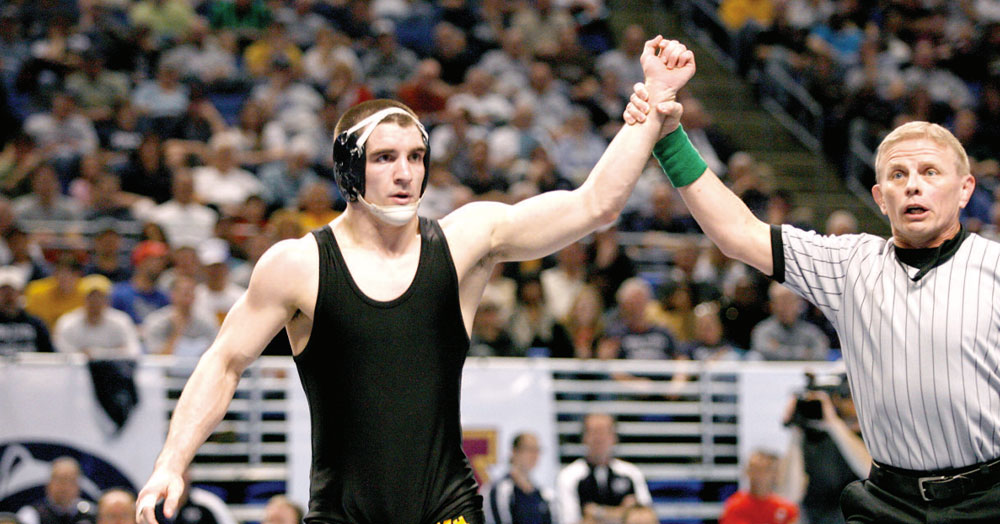Iowa Athletics Hall of Fame
Brent Metcalf (10BA)
Brent Metcalf was a Hawkeye and is now a Cyclone.
Which is why a few of his friends were kidding him when Metcalf, a former Iowa wrestler who is now an assistant coach at Iowa State, was chosen as one of the members of the 2023 UI Athletics Hall of Fame class.
“They were saying, ‘You sure you want to do this?’” Metcalf says, laughing.
But Metcalf knows how important his time was at Iowa and what he accomplished.
Metcalf was a two-time NCAA champion (2008, 2010) at 149 pounds, and was a three-time All-American. Metcalf was the 2008 winner of the Hodge Trophy, given to the top college wrestler in the nation, and he helped Iowa win three NCAA national championships.
Metcalf, who started his career at Virginia Tech, transferred to Iowa when his coach with the Hokies, Tom Brands (92BS), was named the head coach of the Hawkeyes in 2006.
“I really didn’t plan on going to Iowa, but Tom left, and I wanted to go with him,” Metcalf says. “I really didn’t even understand what it was to be an Iowa wrestler. When I came, it was kind of a surprise. I looked at everything they had done, and I was like, ‘Wow, this is really cool. How did I end up here?’”

PHOTO: HAWKEYESPORTS.COM
Metcalf had a dominating career with the Hawkeyes. He finished his collegiate career with a 108-3 record—the .973 winning percentage is second-best in program history. He had a 69-match winning streak from 2008-09, and he had 47 career falls. Metcalf also won the 2008 Jesse Owens Athlete of the Year award from the Big Ten.
“The first national title is always significant because you grow up thinking about doing that,” Metcalf says. “You don’t really know if you can.
“I always thought the Jesse Owens (award) was pretty cool, too. I always felt like that was reserved for football players, basketball players, these high-profile athletes. The fact they chose me one year was pretty cool.”
Metcalf stayed around the Iowa program when he was training for his international career, which included a 2014 World Cup championship.
“The wrestling experience, the experience of the culture (at Iowa), you really learn a lot,” Metcalf says. “Going through it and doing it, doing it at a high level, and doing it at a high-level program, was an example of how it can be done.
“I got to spend a lot of time there after I was done with college, and I got to be in more of a mentor role, and there was a ton of value there because you’re older and working with these young kids. It allowed me to recognize individual talents, different things about kids, the things that make them click. Getting the most out of those guys is something that is great to learn from.”
Now he’s on the other side of a rivalry with his former school.
“We’re competitors, it’s a part of what it is,” Metcalf says. “There can be a middle ground. We can compete really hard, and then we can step back and realize we’re people, too. That’s the kind of perspective I take on it.”
—JOHN BOHNENKAMP
